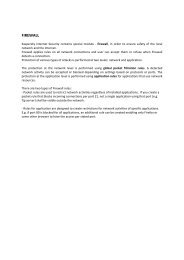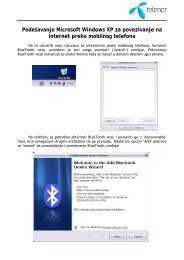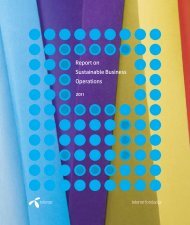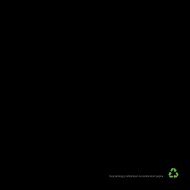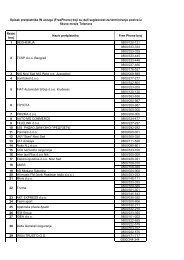Download report for 2008 (PDF format) - Telenor
Download report for 2008 (PDF format) - Telenor
Download report for 2008 (PDF format) - Telenor
Create successful ePaper yourself
Turn your PDF publications into a flip-book with our unique Google optimized e-Paper software.
ENVIRONMENT<br />
Being a company in the ICT sector, when it comes to environmental issues, we focus on 1. energy consumption and<br />
climate change and 2. materials and waste.<br />
Our Response To Climate Change<br />
<strong>Telenor</strong>’s impact on the environment is mainly due to the energy consumption, CO2 emissions, waste and visual<br />
intrusion. In order to adjust to a low-carbon future <strong>Telenor</strong> has established the Climate Change Program that will<br />
reduce the carbon footprint of our activities and promote the development of solutions that can help our customers<br />
reduce their own carbon emissions. Key areas of the program are: our emissions, employee involvement, business<br />
opportunities and renewable energy.<br />
In a low-carbon society, the first priority is to take responsibility <strong>for</strong> our own emissions of CO2. Cutting carbon<br />
emission means saving energy and cutting costs, and this <strong>for</strong>ms the basis <strong>for</strong> sustainable growth. We will take steps<br />
to ensure that our networks and base stations are as energy efficient as possible. In some countries <strong>Telenor</strong> is even<br />
employing renewable energy sources to power network equipment, and we are testing solar-powered base stations<br />
and repeater sites. A promising result is that these renewable energy sources produce more energy than is required<br />
to power the base stations. This excess electricity can be used to benefit local communities in the future. In order to<br />
achieve this, <strong>Telenor</strong> will depend on strong partnerships with energy providers.<br />
Reducing the need <strong>for</strong> transport and travel is another priority. We are relying on virtual tools, such as<br />
videoconferencing and we have established an internal program to help our employees share in<strong>for</strong>mation and<br />
communicate in ways that do not harm the environment.<br />
Recycling Campaign<br />
<strong>Telenor</strong> recycles tens of thousands of mobile phones through its recycling program in Serbia. Through this<br />
campaign <strong>Telenor</strong> actively participates in solving the growing issue of electronic waste and raising environmental<br />
awareness of the local public.<br />
A majority of mobile telecommunication users usually buy new mobile phone handsets every two years. Due to<br />
this a large number of old mobile phones ends up as regular waste. More than 90 percent of the materials could<br />
be recycled and reused. Batteries, which represent 15 to 30 percent of the materials, could significantly harm the<br />
environment. The consequences are double: discarding old mobile phone sets means also discarding inert gases,<br />
metals, and this type of electronic waste pollutes the environment since it causes the release of toxic substances,<br />
such as lithium and cadmium. We are proud to say that we have recycled more than 75,000 old cell phones<br />
during a three-month campaign.<br />
8 Corporate Responsibility




